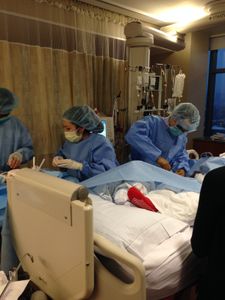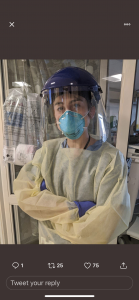Clinical Training
Pulmonary Fellowship Training
Fellows rotate between two hospitals, Boston Medical Center and the Boston VA Medical Center; together, these facilities provide rich and diverse clinical material. Boston Medical Center, formed by the merger of Boston City Hospital and Boston University Medical Center Hospital, provides a unique clinical training ground for subspecialty training in pulmonary and critical care medicine. Boston Medical Center has a long tradition of providing high quality care to indigent patients and continues to attract a large number of inner city, immigrant, and HIV-positive patients, consistent with its roots as Boston’s only public hospital. Boston Medical Center also provides a full range of tertiary level medical care with active programs in thoracic oncology, solid organ and bone marrow transplantation, cardiac catheterization and cardiac surgery. As a referral center for the entire New England region, the Boston VA provides fellows with the opportunity to direct the initial evaluation of lung cancer, manage severe airway diseases, and work-up a host of rare, infiltrative lung diseases.
First year fellows rotate through six clinical rotations twice through the year. The clinical rotations and fellow responsibilities include:
ICU at Boston Medical Center (BMC)
This is a hands-on critical care rotation in which the fellows are dedicated to a 28-bed critical care unit. This is a busy, urban ICU where most patients are directly admitted from the emergency room and present with a wide array of acute problems. Under the supervision of the ICU attendings, fellows oversee care of critically ill patients and perform procedures. To facilitate their role as academicians, fellows are actively involved in the education of the medical house staff. Fellows lead daily “Vent Rounds” with the ICU respiratory therapist and critical care nurse. In this capacity, fellows expand their knowledge base of ventilator management and expedite the weaning of patients from the ventilator.
Pulmonary Consult Service
In this rotation, the fellow is responsible for all in-patient pulmonary consultations and performance of all bronchoscopies. This includes inpatient and outpatient bronchoscopies as well as learning advanced bronchoscopy techniques including linear endobronchial ultrasound (EBUS), navigational bronchoscopy, and robotic bronchoscopy. On the consult service, fellows have the opportunity to see patients with a wide range of acute pulmonary problems, including a large number of international health problems (TB and other infectious diseases), pulmonary complications of HIV, sickle cell disease, and obstetric pulmonary problems. The fellow is also responsible for critical care consultative services to patients in the other critical care units of BMC including the CCU and SICU. Reflecting the tertiary level of care provided at Boston Medical Center, patients present with complex medical problems including pulmonary complications of bone marrow and solid organ transplantation, rheumatologic disorders, malignancy and chemotherapy related lung disease. In addition, there are active thoracic oncology, neurosurgery, cardiac surgery and interventional cardiology services, providing the fellow with a broad exposure to numerous complex, pulmonary problems typical of an academic medical center.

Physiology Rotation
The Pulmonary Hypertension Center at Boston Medical Center is a tertiary referral center for patients with a variety of pulmonary vascular diseases. Fellows on this rotation work with Dr. Elizabeth Klings and Dr. Hector Marquez daily in the care of patients admitted to the Pulmonary Hypertension Service. This fellow also is part of a multi-disciplinary PERT team (Pulmonary Embolism Response Team. The pulmonary fellow along with a cardiovascular fellow see all PERT consults and facilitate the multi-disciplinary discussion regarding the appropriate management of each patient presenting with an acute submassive/massive pulmonary embolism. The fellow on this rotation performs all the right heart catheterizations for patients undergoing evaluation for pulmonary hypertension. The pulmonary hypertension team performs more than 100 right heart catheterizations per year. In addition, the fellow on the physiology rotation will read and interpret the pulmonary function tests performed daily at Boston Medical Center, with attending supervision and education on the finer points of PFT interpretation. The physiology fellow is also responsible for the management of the Pleural Service patients. This rotation allows for a dedicated experience in diagnosing and managing disease of the pleura. This involves a dedicated pleural curriculum to review historical and contemporary literature surrounding pleural disease as well as procedural experience with thoracentesis, chest tube placement, and tunneled pleural catheter (Pleur-x) placement under the supervision of the Pleural Service attending. Pulmonary fellows on this rotation develop extensive experience with thoracic ultrasound. This main theme of the physiology rotation is the physiology of the the parenchymal, pleural and vascular systems of the lung.
VA Outpatient/ Pulmonary Acute Care Clinic
In this rotation the fellow performs outpatient consults and outpatient pulmonary workups. In this role, fellows perform a variety of outpatient procedures including referral for bronchoscopy, pleural biopsies, thoracenteses. Fellows are directly responsible for the evaluation and presentation of new lung cancer cases to the multidisciplinary Lung Cancer Board. The clinic also has medical residents that rotate through, and the clinic is supervised daily by a pulmonary attending. Since physicians throughout New England refer patients to this clinic, there is a rich and diverse array of pulmonary pathology.
VA inpatient consult/Procedures
This is a combined pulmonary and critical care medicine rotation. Fellows are responsible for consults on the inpatient medical service; maintaining contact with and assisting the MICU team and ICU attending physician; performing and supervising procedures in the MICU (bronchoscopies, Swan-Ganz catheters, central line placement); and the supervision and education of medical residents assigned to the MICU team; and performing outpatient bronchoscopies referred for this procedure by the Pulmonary Acute Care Clinic and the continuity clinics. The first year fellows share approximately 200 bronchoscopies annually during this rotation. The Fellows are also responsible for providing critical care consultative services for patients in the surgical critical care and coronary care units of the VAMC.
Cardiopulmonary Exercise Testing Rotation:
Fellows rotate through the CPET lab during the second and third years. In this capacity, they are responsible for assessing the appropriateness of the indication for CPET, as well as the evaluation, execution, and analysis of the study. Fellows review each CPET on an individual basis with a supervising attending. The educational goals of this rotation include becoming familiar with the indications and contraindications for CPET, determining the impact of co-morbid medical conditions on exercise physiology, and the utilization of CPET for pre-operative assessment for patients prior to thoracic surgery.
Lung Transplantation Rotation:
Second year pulmonary and critical care medicine fellows rotate for a month on the Lung Transplantation Service at the Brigham and Women’s Hospital. During this rotation, pulmonary fellows have the opportunity to work with patients who are being evaluated for lung transplantation and those who have undergone lung transplantation. Fellows learn about the proper care of lung transplant patients, along with the potential complications that may occur. Fellows learn about the long-term complications faced by lung transplant patients such as rejection, infection, malignancy or deteriorating lung function. Fellows are participating in bronchoscopies performed to assess for infection as well as rejection. During this rotation, fellows develop a better understanding of the immune suppression used for lung transplant patients. Fellows also have an opportunity to assist in the critical care management of a newly transplanted patient on mechanical ventilation.


